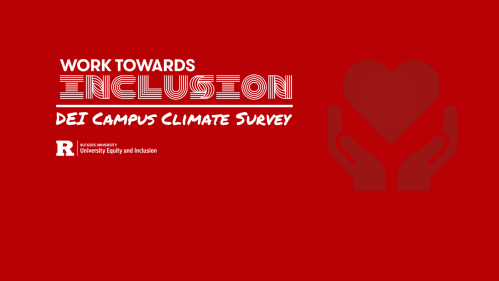
Climate Survey Background & Frequently Asked Questions
When was the data collected?
Most of the data for the Rutgers DEI Campus Climate Survey was collected between March 20 and May 10. To learn more, scroll down to review the list of frequently asked questions.
Background
The Rutgers DEI Campus Climate Survey survey was designed to help administrators develop shared knowledge around diversity, equity, and inclusion issues by learning about the community’s perspectives, opinions, and experiences related to these topics. Data collected in the DEI campus climate survey will establish a baseline understanding of the present climate, help inform current and future decisions about supporting a diverse, inclusive, and vibrant campus community, and serve as a benchmark against which to measure change over time.

The Results Are In!
On April 8, 2024, we shared reports that highlight findings at the Chancellor-led unit level (Rutgers–New Brunswick, Rutgers–Newark, Rutgers–Camden, and Rutgers Health) as well as for university central administration.


Why take the DEI Campus Climate Survey?
Accordion Content
-
Campus climate reflects “community members’ attitudes, perceptions, behaviors, and expectations around issues of race, ethnicity, and diversity.” [1] Though initially focused on understanding perceptions and experiences of minoritized students (women in STEM, students of color generally, and Black students in particular),[2] increasingly research on campus climate encompasses a multi-dimensional environmental perspective involving multiple groups (faculty, students, administrators, and staff) and aspects of difference, such as race/ethnicity, gender, sexuality, religion, ability status, and more.
[1] Hurtado, S., Griffin, K. A., Arellano, L., & Cuellar, M. (2008). Assessing the value of climate assessments: Progress and future directions. Journal of Diversity in Higher Education, 1(4), 204–221.
[2] Griffin, K. (2018). Addressing STEM Culture and Climate to Increase Diversity in STEM Disciplines. Higher Education Today.
-
Yes. Your answers and personal information will be kept confidential and will be analyzed only after being grouped together with those of hundreds of other students, faculty, or staff. Names will not be linked to responses, and no attempt will be made to identify any individual participant. Staff and faculty will be grouped within broad units to ensure anonymity. SoundRocket, a social science survey research firm in Ann Arbor, Michigan, is administering this study for Rutgers University and has been hired to safeguard your data.
Background institutional data, specifically race, gender, and organizational unit (Rutgers–New Brunswick, Rutgers–Newark, Rutgers–Camden, Rutgers Biomedical and Health Sciences or University Central Administration) were shared with SoundRocket. This data was linked to your name and email address, which will be used as a unique key to ensure that only members of our campus community are able to take the survey, and to enable the sending of personalized survey reminders. Your demographic data (race and gender) will be used to determine at the close of the survey, how well individuals who took the survey reflect the university population as whole. For undergraduate and graduate students only, Rutgers ID is linked via a confidential key to enable institutional research to assess long-term the relationship between perceptions of campus climate and student success.
Once the study is completed, summaries of these data, which will not contain identifying information on you or any other individual participating in the survey, may be made available to others for related studies to improve protocols, evaluate programs, assess policies, or provide background for future research on these topics.
-
To assess perceptions of the campus climate that pertain to your social identity, a series of specific demographic questions are asked including (but not limited to): race/ethnicity, gender identity (e.g., woman, man, transgender, gender non-conforming), socioeconomic class background, sexual orientation/identity, age, national origin, disability, veteran status, religion or spiritual beliefs, and political opinions. You may skip any questions that you prefer not to answer.
-
No. Even though your individual response is very detailed, it is joined with the responses of thousands of others so that we can see differences in experiences across groups. Reports using your answers will be prepared at the Chancellor-led unit level (New Brunswick, Newark, Camden, and RBHS) as well as University Central Administration. Additional reports will be available at the secondary unit level, if the unit has more than 200 people across roles (faculty, staff, and students), such as the School of Arts and Sciences. If a unit has less than 200 people, it has been grouped with other units to preserve the anonymity of responses. Reports will not be available at the department level. For a role (such as students) to appear in the secondary report, there must be at least 10 respondents in that category. For a demographic characteristic to appear in the secondary report (such as Black) there must be at least 15 respondents in that category.
-
This question aims to capture the diversity of experiences within multiracial identity. Some multiracial individuals strongly identify with one racial and ethnic identity over another. However, feel free to skip this question if it does not apply. For example, you identify with all of your racial and ethnic identities equally.
-
All eligible participants in the student, staff and faculty surveys will be included in a random drawing to win great prizes! (1) an Apple iPad, (2) one of fifty (50) $25 gift cards, or (3) one of fifty (50) Work Towards Inclusion Sweatshirts. Winners will be notified after the data collection is completed via email. Winners must respond to the notification and provide a valid mailing address to which the card or sweatshirt will be mailed.
-
No, the email you received on March 20 and the survey link it contained are personalized to you to make it as easy as possible to take the survey.
-
The survey will take about 10 to 15 minutes to complete on average, although the exact time will vary depending on your experiences. You can choose to skip or not answer any of the questions, and you may stop your participation at any time.
-
This question is asked of all faculty and staff, it aims to capture which campus you report to for work. Here are few examples;
- If you work for New Jersey Medical School you would report Newark.
- If you work for Rutgers Business School in New Brunswick, you would report New Brunswick. Similarly, if you work in Newark, you would report Newark.
- If you are staff member employed by a central unit, and work in Knightsbridge, you would report New Brunswick.
- If you are a staff member employed by a central unit, such as IP&O, and work in Camden, you would report Camden.
-
Your personalized survey link, includes the Chancellor-led unit you are in (or University Central Administration) as well as your role (undergraduate students, graduate students, staff, faculty) since there are different versions of the survey depending on your role. This data was pre-populated to ensure accuracy.
-
To complete the survey you must be 18 years old, so age is a mandatory question in order to participate.
The other mandatory question is what year did you first arrive at Rutgers University. Your answer will be compiled with all survey respondents to understand whether individuals who have been affiliated with the university for different lengths of time have differing perceptions of the campus climate.
-
The Rutgers DEI Campus Climate Survey is a slight adaptation of the National Campus Climate Survey (NCCS), which is a web-based survey administered by SoundRocket (a social science survey research firm located in Ann Arbor, Michigan) that asks faculty, staff, and students about their perspectives on diversity, equity and inclusion at the institution. Specifically, it assesses:
- Perceptions of the inclusiveness of the university community overall
- Perceptions of individual employment and/or academic experiences
- Perceptions of whether experiences and interactions were shaped by social identity
- Perceptions of fair and equitable treatment
-
All students attending Rutgers University and taking at least 6 credit hours as of October 7, 2022, all full-time staff (including the Rutgers University Foundation), and faculty (including part-time) employed by November 1 will be invited to participate. All respondents must be at least 18 years old to complete the questionnaire.
-
If you are interrupted while taking the survey and need to close your browser, you may click on the personalized survey link again and pick up right where you left off.
-
No. Participation in this survey is voluntary, but we need to hear from as many members of the Rutgers community as possible for the survey data to be meaningful. We need responses from a representative cross-section of the Rutgers community (faculty, staff, and students). This is an opportunity for all parts of the university, from faculty to dining hall staff to students and senior administrators to share their experience and help us accurately assess the DEI campus climate at Rutgers. Your response to the survey is important.
-
This study is being paid for by Rutgers University.
-
If you would like to speak to someone about this survey, please contact the SoundRocket survey team via email at support@srsrv.com or by phone at 734-527-2199.
-
If you would like to speak to someone at Rutgers about this survey, please contact the University Equity and Inclusion team via email at diversity@rutgers.edu or by phone at 848-932-4400.
-
Rutgers is a complex and comprehensive university. For clarity and impact, we are promoting the campus climate survey as a university-wide project, but the questionnaire will enable individuals to select their organizational unit (Rutgers–New Brunswick, Rutgers–Newark, Rutgers–Camden, Rutgers Biomedical and Health Sciences, or University Central Administration). Primary reports will be generated at the organizational unit level to share results for faculty, students (undergraduate and graduate), and staff. Secondary reports will also be generated at the school/administrative unit level within organizational units, in cases where an administrative unit has less than 200 people, it will be grouped with other units to preserve anonymity. Reports will not be available at the department level.
-
Rutgers University is committed to maintaining a nondiscriminatory and harassment free learning, research and work environment. This includes, but is not limited to all policies, practices, and conditions of employment. To report discrimination and/or harassment prohibited by college policy, please contact:
Office of Employment Equity
Administration Services Building (ASB) II
57 US Highway 1, New Brunswick, NJ
Office: (848) 932-3973
Email: employmentequity@hr.rutgers.edu
Implementing the University Diversity Strategic Plan
All Chancellor-led units made the administration of campus climate surveys for students, staff, and faculty a goal. The results of the DEI Campus Climate Survey will enable us to assess whether our diversity, equity and inclusion values are reflected in the daily experience of students, faculty and staff in order to better understand the challenges of creating an environment that is respectful and inclusive for all.
Coordinating this DEI campus climate survey in a scholarly and rigorous manner will enable us to gain insights into how various groups experience the campus climate and we will use future studies to assess longitudinal changes.

Perceptions Matter
We share campus spaces, but we are not all having the same experiences.
-
Who finds the environment chilly or warm? Who feels included or excluded?
-
Who is present and who is absent? Who is thriving and who is not?
-
What are the norms in this environment? How do people treat each other?
Share your experiences. Use your voice.
This survey is part of a larger effort to use research-based assessment methods to gather data that will help the university realize opportunities to make Rutgers a better place to work and learn.


Campus Climate Impacts Success
The American Council on Education partnered with the National Center for Institutional Diversity at University of Michigan on a blog series on campus climate and STEM Success. Check out a few posts below.
Another Campus Climate Survey?
Yes, but this one is focused on diversity, equity, and inclusion. Metaphorically, campus climate work is similar to climate work in the environment. We map the climate, ask questions, and work to improve it.
Missed the DEI campus climate survey launch webinar? View the recording anytime.

